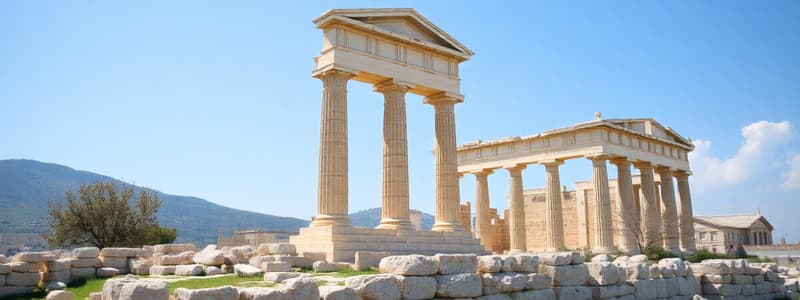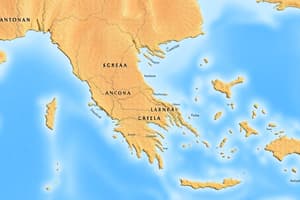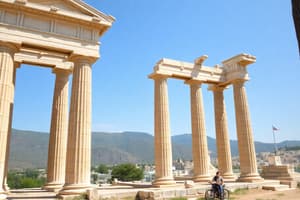Podcast
Questions and Answers
Which civilization is recognized as the birthplace of modern Western civilization?
Which civilization is recognized as the birthplace of modern Western civilization?
- Ancient Greece (correct)
- Ancient Egypt
- Roman Empire
- Minoan civilization
How did the geography of Greece affect its ancient societies?
How did the geography of Greece affect its ancient societies?
- Facilitated large empire formations
- Enabled trade with distant lands
- Led to the isolation of various societies (correct)
- Promoted unity among city-states
What percentage of Greece's terrain is mountainous?
What percentage of Greece's terrain is mountainous?
- 90%
- 50%
- 60%
- 80% (correct)
What was a significant feature of the Minoan civilization that showcased its advanced society?
What was a significant feature of the Minoan civilization that showcased its advanced society?
Which legendary hero is said to have first ruled the Mycenaean civilization?
Which legendary hero is said to have first ruled the Mycenaean civilization?
What was the notable military achievement of the Mycenaean civilization?
What was the notable military achievement of the Mycenaean civilization?
What is believed to have caused the decline of the Minoan civilization around 1450 BCE?
What is believed to have caused the decline of the Minoan civilization around 1450 BCE?
How were the Mycenaeans different from the Minoans in terms of language and cultural background?
How were the Mycenaeans different from the Minoans in terms of language and cultural background?
What marked the beginning of the Dark Ages in Ancient Greece?
What marked the beginning of the Dark Ages in Ancient Greece?
Which metal began to replace Bronze during the Dark Ages?
Which metal began to replace Bronze during the Dark Ages?
What significant literary figure emerged during the Dark Ages?
What significant literary figure emerged during the Dark Ages?
What was one of the major societal advancements during the Archaic Age?
What was one of the major societal advancements during the Archaic Age?
How did geography influence the formation of the polis?
How did geography influence the formation of the polis?
What is the literal translation of the term 'polis'?
What is the literal translation of the term 'polis'?
Which event prompted many Greeks to migrate to Ionia?
Which event prompted many Greeks to migrate to Ionia?
What significant achievement was made during the Dark Ages regarding communication?
What significant achievement was made during the Dark Ages regarding communication?
What primary function did the acropolis serve during attacks?
What primary function did the acropolis serve during attacks?
What significant military advancement was created during the Archaic Age?
What significant military advancement was created during the Archaic Age?
What impact did trade and colonization have during the Archaic Age?
What impact did trade and colonization have during the Archaic Age?
How did the rise of wealthy merchants affect the power dynamics in Greek city-states?
How did the rise of wealthy merchants affect the power dynamics in Greek city-states?
What legacy did tyrants leave in the Greek political landscape?
What legacy did tyrants leave in the Greek political landscape?
What led to the eventual ousting of many tyrants around 600 BCE?
What led to the eventual ousting of many tyrants around 600 BCE?
What was the initial form of governance in Athens around 700 BCE?
What was the initial form of governance in Athens around 700 BCE?
What aspect of geography significantly contributed to the protection of ancient civilizations?
What aspect of geography significantly contributed to the protection of ancient civilizations?
Which development is a consequence of humans settling in one location?
Which development is a consequence of humans settling in one location?
How did the geographical features of Greece influence its city-states?
How did the geographical features of Greece influence its city-states?
What concept from Ancient Greece can be traced back to over 3,000 years and heavily influences modern society?
What concept from Ancient Greece can be traced back to over 3,000 years and heavily influences modern society?
What was a key factor that allowed for the spread of common traditions among ancient Greek societies?
What was a key factor that allowed for the spread of common traditions among ancient Greek societies?
What was a pivotal factor that contributed to the societal collapse around 1100 BCE in Ancient Greece?
What was a pivotal factor that contributed to the societal collapse around 1100 BCE in Ancient Greece?
Which notable figure's works played a significant role in shaping the cultural landscape during the Dark Ages?
Which notable figure's works played a significant role in shaping the cultural landscape during the Dark Ages?
What crucial development characterized the Archaic Age of Greek society between 750 to 500 BCE?
What crucial development characterized the Archaic Age of Greek society between 750 to 500 BCE?
What was one of the primary reasons why many Greek city-states declined in population after the collapse of Mycenae?
What was one of the primary reasons why many Greek city-states declined in population after the collapse of Mycenae?
What writing system was adopted during the Dark Ages that significantly impacted Greek culture?
What writing system was adopted during the Dark Ages that significantly impacted Greek culture?
What consequence did Draco's harsh penalties for debt violations have on Athenian society?
What consequence did Draco's harsh penalties for debt violations have on Athenian society?
Which significant reform did Cleisthenes implement to contribute to the development of Athenian democracy?
Which significant reform did Cleisthenes implement to contribute to the development of Athenian democracy?
At what age did Spartan boys begin their military training?
At what age did Spartan boys begin their military training?
What was one way Spartan society maintained social order?
What was one way Spartan society maintained social order?
During what period did Sparta establish its dominance among Peloponnesian city-states?
During what period did Sparta establish its dominance among Peloponnesian city-states?
What was a key factor leading to the civil unrest in Athens during Draco's governance?
What was a key factor leading to the civil unrest in Athens during Draco's governance?
What significant geopolitical confrontation marked the Classical Greece period?
What significant geopolitical confrontation marked the Classical Greece period?
What role did the acropolis play in Greek city-states besides serving as a fortified refuge?
What role did the acropolis play in Greek city-states besides serving as a fortified refuge?
Which of the following was not a consequence of the military advancements during the Archaic Age?
Which of the following was not a consequence of the military advancements during the Archaic Age?
What significant political change occurred across many city-states due to the rise of tyrants?
What significant political change occurred across many city-states due to the rise of tyrants?
How did tyrants initially maintain their popularity among citizens?
How did tyrants initially maintain their popularity among citizens?
What was one outcome of the economic developments during the Archaic Age?
What was one outcome of the economic developments during the Archaic Age?
Which political system emerged in some Greek city-states following the rule of tyrants?
Which political system emerged in some Greek city-states following the rule of tyrants?
Why were tyrants viewed negatively by the Greeks despite some initial benefits?
Why were tyrants viewed negatively by the Greeks despite some initial benefits?
What was a defining characteristic of the phalanx formation used by Greek city-states?
What was a defining characteristic of the phalanx formation used by Greek city-states?
Flashcards
Ancient Greece's Geography
Ancient Greece's Geography
The geography of Greece, with its mountains, islands, small plains, and river regions, influenced the development of independent city-states from common traditions.
Origins of Modern Western Civilization
Origins of Modern Western Civilization
Ancient Greece is considered the birthplace of modern western civilization, as it laid the groundwork for government, science, philosophy, and architecture.
Development of Civilization
Development of Civilization
The establishment of settlements led to the construction of buildings, irrigation, and social organization. Specialized jobs, infrastructure, and forms of government developed, creating sophisticated societies.
Essential Geographical Factors
Essential Geographical Factors
Signup and view all the flashcards
Importance of Geography
Importance of Geography
Signup and view all the flashcards
Minoan Civilization
Minoan Civilization
Signup and view all the flashcards
Mycenaean Civilization
Mycenaean Civilization
Signup and view all the flashcards
Trojan War
Trojan War
Signup and view all the flashcards
Dark Ages
Dark Ages
Signup and view all the flashcards
Greek City-States
Greek City-States
Signup and view all the flashcards
Dark Ages in Ancient Greece
Dark Ages in Ancient Greece
Signup and view all the flashcards
Polis
Polis
Signup and view all the flashcards
Archaic Age
Archaic Age
Signup and view all the flashcards
Troy and Mycenae
Troy and Mycenae
Signup and view all the flashcards
Ionia
Ionia
Signup and view all the flashcards
Technological Advancements in the Dark Ages
Technological Advancements in the Dark Ages
Signup and view all the flashcards
Geography and Polis
Geography and Polis
Signup and view all the flashcards
Acropolis Function
Acropolis Function
Signup and view all the flashcards
Agora Purpose
Agora Purpose
Signup and view all the flashcards
Phalanx Formation
Phalanx Formation
Signup and view all the flashcards
Greek Colonization
Greek Colonization
Signup and view all the flashcards
Rise of Tyrants
Rise of Tyrants
Signup and view all the flashcards
Rule of Law in Greece
Rule of Law in Greece
Signup and view all the flashcards
Athens' Political Evolution
Athens' Political Evolution
Signup and view all the flashcards
Geography's Impact on Civilization
Geography's Impact on Civilization
Signup and view all the flashcards
Greek City-States: Impact of Geography
Greek City-States: Impact of Geography
Signup and view all the flashcards
Birthplace of Western Civilization
Birthplace of Western Civilization
Signup and view all the flashcards
Development of Civilization: From Settlements to Societies
Development of Civilization: From Settlements to Societies
Signup and view all the flashcards
Why Were Ancient Greeks So Successful?
Why Were Ancient Greeks So Successful?
Signup and view all the flashcards
What was the Acropolis?
What was the Acropolis?
Signup and view all the flashcards
What was the Agora?
What was the Agora?
Signup and view all the flashcards
What was the Phalanx?
What was the Phalanx?
Signup and view all the flashcards
What was the significance of Greek colonization?
What was the significance of Greek colonization?
Signup and view all the flashcards
Why did tyrants emerge in ancient Greece?
Why did tyrants emerge in ancient Greece?
Signup and view all the flashcards
What impact did tyrants have on ancient Greece?
What impact did tyrants have on ancient Greece?
Signup and view all the flashcards
How did the Greeks view the rule of law?
How did the Greeks view the rule of law?
Signup and view all the flashcards
What were the stages of Athens' political evolution?
What were the stages of Athens' political evolution?
Signup and view all the flashcards
Dark Ages of Greece
Dark Ages of Greece
Signup and view all the flashcards
Rise of the Polis
Rise of the Polis
Signup and view all the flashcards
What is the 'Acropolis'?
What is the 'Acropolis'?
Signup and view all the flashcards
Influence of Geography on Polis
Influence of Geography on Polis
Signup and view all the flashcards
Homer - The Iliad and Odyssey
Homer - The Iliad and Odyssey
Signup and view all the flashcards
Draco's Laws
Draco's Laws
Signup and view all the flashcards
Civil Unrest in Athens
Civil Unrest in Athens
Signup and view all the flashcards
Cleisthenes' Reforms
Cleisthenes' Reforms
Signup and view all the flashcards
Sparta's Military Focus
Sparta's Military Focus
Signup and view all the flashcards
Cultural Restrictions in Sparta
Cultural Restrictions in Sparta
Signup and view all the flashcards
Sparta's Dominance
Sparta's Dominance
Signup and view all the flashcards
Classical Greece and Persia
Classical Greece and Persia
Signup and view all the flashcards
Study Notes
Ancient Greece: Geography's Role
- Geography is crucial in determining living locations and interactions
- Proximity to water sources (lakes, rivers) is essential for agriculture and farming
- Natural barriers (mountains, bodies of water) protect from invaders
- Ideal climates with consistent rainfall support crop growth
- Suitable geographical features create ideal human settlements
Development of Civilization
- Permanent settlements led to significant advancements
- Stone buildings, irrigation systems, and improved farming practices were developed
- Organization of society with specialized roles (carpenters, stone masons, blacksmiths) arose
- Infrastructure developments like roads and sewage systems contributed to civilization's growth
Ancient Greece
- Historians consider Ancient Greece the birthplace of modern Western civilization, rooted in European culture
- Concepts of government, science, philosophy and architecture trace back over 3,000 years to Ancient Greece
- Minoan (2500-1450 BCE) and Mycenaean (1600-1100 BCE) civilizations preceded Ancient Greece.
Geographical Influence
- Greece's geography significantly influenced development
- Mountains and islands created isolated city-states
- Shared traditions, languages, and religions spread through trade and colonization
- Independent city-states frequently clashed
Minoan Civilization
- Located on Crete, a significant precursor to Ancient Greek society
- Advanced society with intricate palaces like Knossos
- Sophisticated drainage and sewage systems
- Skilled artisans and traders
- 2000-1450 BCE
- The exact reason for the civilization's collapse is unclear, but it is believed to have suffered a catastrophe
Mycenaean Civilization
- Located on the Greek mainland near Athens
- Developed as early city-states
- Military culture and fortified cities (like Mycenae)
- Indo-European language; closely related to modern Greek
- Kings ruled over fortified towns, forming alliances.
- Known as the first true Greek City-state
- 1600-1100 BCE
Dark Ages
- Internal conflicts and competition led to the decline of the Mycenaean civilization around 1100 BCE
- Marking the beginning of the "Dark Ages"
- Decrease in food production causing population decline
- Settlements were abandoned
- Transition to Iron implements.
- Continued trade networks, colonization
- Rise of Homer and the epic poems (Iliad and Odyssey)
Archaic Age (750-500 BCE)
- Emergence of powerful city-states ("polis")
- Fortified refuge sites (acropolis)
- Open public areas (agora)—civic centers
- Development of trade routes and military advancements (phalanx formation)
- Formation of Greek city-states from independent settlements.
Rise of City-State Democracy
- 700 BCE- Athens transitioned from monarchy to oligarchy—rule by a select few wealthy landowners
- 600 BCE- Draco introduces codified laws (Draconian laws). Harsh penalties led to widespread discontent.
- Following the tyrants, Athenian aristocracy developed democracy. Rise of Cleisthenes who established the council of 500.
- Athens (and other city-states) developed political systems and institutions.
Sparta's Military Focus
- Developed as a military state with strict social structures
- Spartan society focused on military training and prowess
- Enslaved individuals (helots) provided labor to the Spartans.
Classical Greece and Persian Conflicts
- Significant developments and Greek society expansion
- Confrontation with the Persian empire
- Battle of Marathon (490 BCE),
- Battle of Thermopylae (480 BCE)
- Battle of Salamis and Plataea (480 BCE)
- Greece successfully repelled Persian invasion
Cultural Flourishing Following Persia
- Achievements in architecture (Parthenon)
- Expansion of arts, including playwrights(Sophocles).
- Advancement in intellectual pursuits (philosophy, history)
- Development of mathematical principles (Pythagoras)
- Internal conflicts arose between city-states creating the Peloponnesian Wars (that weakened them)
- neither side achieved a decisive victory and contributed to weakening of the city-states.
Hellenistic Era
- Alexander the Great's conquests unified much of the known world under Greek influence (spreading Greek culture)
- Alexander's empire was vast
- Greek culture spread extensively through his conquests, with subsequent blending of cultures.
- The era is named after Alexander the Great and its unification of the known world.
Greek Mythology (Key Deities)
- Zeus: King of the Gods, associated with weather, law and fate
- Hera: Queen of the Gods, presides over women and marriage
- Aphrodite: Goddess of beauty and love
- Apollo: God of prophecy, music, poetry, and knowledge
- Ares: God of War
- Artemis: Goddess of hunting, animals, and childbirth
- Athena: Goddess of wisdom and defense
- Poseidon: God of the Sea
Studying That Suits You
Use AI to generate personalized quizzes and flashcards to suit your learning preferences.
Related Documents
Description
Explore the vital influence of geography on the development of Ancient Greece. This quiz covers how natural features shaped human settlements, agricultural practices, and the growth of civilization. Understand the foundations that laid the groundwork for modern Western culture.




